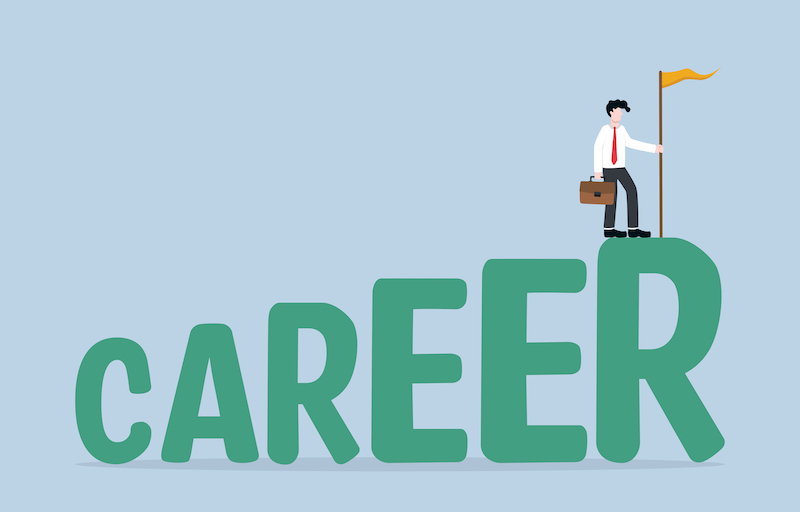Have you ever wondered how some individuals achieve remarkable success in their careers? They often possess a magical formula that propels them forward while others struggle to find their footing. There are no secrets to career success, but rather a combination of strategies and attitudes that can help you unlock your true potential. In this guide, we will explore the key factors contributing to a successful career and provide practical steps to achieve your dreams.

Strategies for Career Success
1. Setting Your Goals
Setting clear goals is the first step toward realizing your career aspirations. By defining what you want to achieve, you create a roadmap that guides your actions and decisions. Let’s delve into two important aspects of goal setting: determining your passion and setting SMART goals.
1.1 Determining Your Passion
Passion is the driving force behind any successful career. Take some time to reflect on your interests, values, and strengths. What activities bring you joy and fulfillment? Identifying your passion will help you align your career choices with what motivates you.
1.2 Setting SMART Goals
SMART goals are specific, measurable, achievable, relevant, and time-bound. When setting your career goals, ensure they meet these criteria. For example, instead of developing a vague goal like “I want to be successful,” set a SMART goal such as “I will increase my sales performance by 20% within six months by implementing targeted marketing strategies.”
2. Developing a Growth Mindset
A growth mindset is a belief that your abilities and intelligence can be developed through dedication and hard work. By adopting a growth mindset, you open yourself up to continuous learning and improvement. Here are three key elements of a growth mindset: embracing challenges, adopting a positive attitude, and cultivating resilience.
2.1 Embracing Challenges
Challenges provide growth opportunities. Instead of avoiding them, embrace challenges as chances to learn and develop new skills. View setbacks as stepping stones toward success rather than roadblocks.
2.2 Adopting a Positive Attitude
Maintaining a positive attitude is crucial in the face of obstacles. Positivity enhances your problem-solving abilities and resilience. Focus on finding solutions rather than dwelling on problems.
2.3 Cultivating Resilience
Resilience is the ability to bounce back from setbacks and keep moving forward. Cultivate resilience by developing coping mechanisms, seeking Support when needed, and reframing failures as learning experiences.
3. Building a Strong Professional Network
A strong professional network can open doors to new opportunities and provide invaluable Support and guidance. Here are three ways to build and nurture your network: attending industry events, utilizing social media platforms, and seeking mentors.
3.1 Attending Industry Events
Industry events such as conferences, seminars, and networking sessions are excellent opportunities to connect with professionals in your field. Engage in meaningful conversations, exchange ideas, and build relationships that can lead to career growth.
3.2 Utilizing Social Media Platforms
Social media platforms like LinkedIn offer a virtual space to connect with industry peers, join professional groups, and showcase your expertise. Actively participate in relevant discussions, share valuable content, and leverage the power of networking online.
3.3 Seeking Mentors
Mentors are vital in providing guidance and Support throughout your career journey. Look for experienced professionals who can share their knowledge and offer valuable insights. A mentor can help you navigate challenges, make informed decisions, and accelerate growth.
4. Acquiring Relevant Skills and Education
Acquiring new skills and knowledge is crucial in today’s rapidly evolving job market. Here are three steps to ensure you stay relevant: identifying skill gaps, pursuing continuous learning, and obtaining certifications.
4.1 Identifying Skill Gaps
Regularly assess your skill set and identify areas that require improvement. Stay updated with industry trends and analyze the skills in demand. By recognizing skill gaps, you can take proactive steps to bridge them.
4.2 Pursuing Continuous Learning
Embrace lifelong learning as a means of personal and professional development. Stay curious and seek opportunities to expand your knowledge through workshops, online courses, seminars, or industry-specific training programs.
4.3 Obtaining Certifications
Certifications demonstrate your expertise and commitment to your field. Identify relevant certificates and invest in obtaining them. They enhance your skill set and boost your credibility and marketability.
5. Taking Calculated Risks
Taking calculated risks is an essential aspect of career growth. Stepping out of your comfort zone and embracing new opportunities can lead to breakthroughs and advancements. Here are two steps to help you take calculated risks: stepping out of your comfort zone and embracing new opportunities.
5.1 Stepping Out of Your Comfort Zone
Growth lies outside your comfort zone. Challenge yourself by taking on new projects or responsibilities that stretch your abilities. Embrace the discomfort and learn from the experience, knowing that it will contribute to your personal and professional growth.
5.2 Embracing New Opportunities
Look for new opportunities that align with your goals and values. Feel free to seize them, even with uncertainty or potential failure. Each opportunity presents a chance to learn, grow, and expand your horizons.
6. Overcoming Obstacles and Failure
Obstacles and failure are inevitable parts of any career journey. How you handle them can make all the difference. Here are two steps to help you overcome obstacles and learn from failure: learning from failure and seeking Support.
6.1 Learning from Failure
Failure is an opportunity for growth and learning. Instead of dwelling on mistakes or setbacks, analyze them objectively. Identify their lessons and make necessary adjustments to improve your future endeavors.
6.2 Seeking Support
Don’t hesitate to seek support when facing challenges. Reach out to mentors, colleagues, or friends who can provide guidance or a fresh perspective. Surround yourself with a support system that encourages and uplifts you during difficult times.
7. Developing Effective Communication Skills
Effective communication is a vital skill that can propel your career forward. Three key elements to developing effective communication skills are active listening, expressing yourself clearly, and building rapport.
7.1 Active Listening
Active listening involves fully engaging with the speaker and understanding their perspective. Practice active listening by maintaining eye contact, asking clarifying questions, and paraphrasing to ensure accurate comprehension.
7.2 Expressing Yourself Clearly
Clear communication is essential in conveying your ideas, thoughts, and goals. Use concise and articulate language, organize your thoughts before speaking or writing, and tailor your message to the audience for maximum impact.
7.3 Building Rapport
Building rapport is about establishing positive connections with others. Cultivate empathy, respect, and authenticity in your interactions. A strong rapport fosters collaboration, trust, and mutually beneficial relationships.
8. Balancing Work and Personal Life
Achieving career success doesn’t mean sacrificing your personal life. Here are three steps to help you maintain a healthy work-life balance: prioritizing self-care, setting boundaries, and managing time effectively.
8.1 Prioritizing Self-Care
Self-care is crucial for overall well-being and productivity. Prioritize activities that recharge and rejuvenate you, such as exercise, hobbies, spending time with loved ones, or pursuing interests outside of work.
8.2 Setting Boundaries
Establish clear boundaries between your work and personal life. Define working hours, minimize distractions, and communicate your limits to colleagues and clients. Respect your boundaries and ensure time for relaxation and rejuvenation.
8.3 Managing Time Effectively
Time management is key to maintaining a healthy work-life balance. Prioritize tasks, set realistic deadlines, and delegate when necessary. Avoid procrastination and optimize your productivity by using time management techniques such as the Pomodoro Technique or task batching.
Conclusion
Achieving career success requires a combination of strategies, attitudes, and continuous personal growth. By setting clear goals, developing a growth mindset, building a strong network, acquiring relevant skills, taking calculated risks, overcoming obstacles, developing effective communication skills, and maintaining a work-life balance, you can unlock the secrets to a fulfilling and successful career. Remember, success is a journey, and it’s within your reach with the right mindset and actions.
Frequently Asked Questions (FAQs)
Q1. How long does it take to achieve career success?
Career success is a subjective and ongoing process. It varies based on individual goals, industries, and personal circumstances. Focus on continuous improvement and celebrate each milestone along the way.
Q2. Can anyone achieve career success?
Yes, anyone can achieve career success with the right mindset, dedication, and strategic actions. Success is not limited to specific individuals but is attainable by those willing to put in the effort.
Q3. Should I focus solely on my career to achieve success?
While career advancement is important, it’s equally essential to maintain a healthy work-life balance. Prioritize your well-being, personal relationships, and professional growth for long-term success and happiness.
Q4. How can I stay motivated throughout my career journey?
Maintaining motivation can be challenging. Set meaningful goals, break them into smaller milestones, and celebrate achievements along the way. Surround yourself with a supportive network and continually seek inspiration through learning and self-reflection.
Q5. Are there shortcuts to career success?
There are no guaranteed shortcuts to career success. It requires dedication, hard work, and perseverance. While some opportunities may accelerate your progress, a solid foundation built on knowledge, skills, and relationships is crucial for sustainable success.


